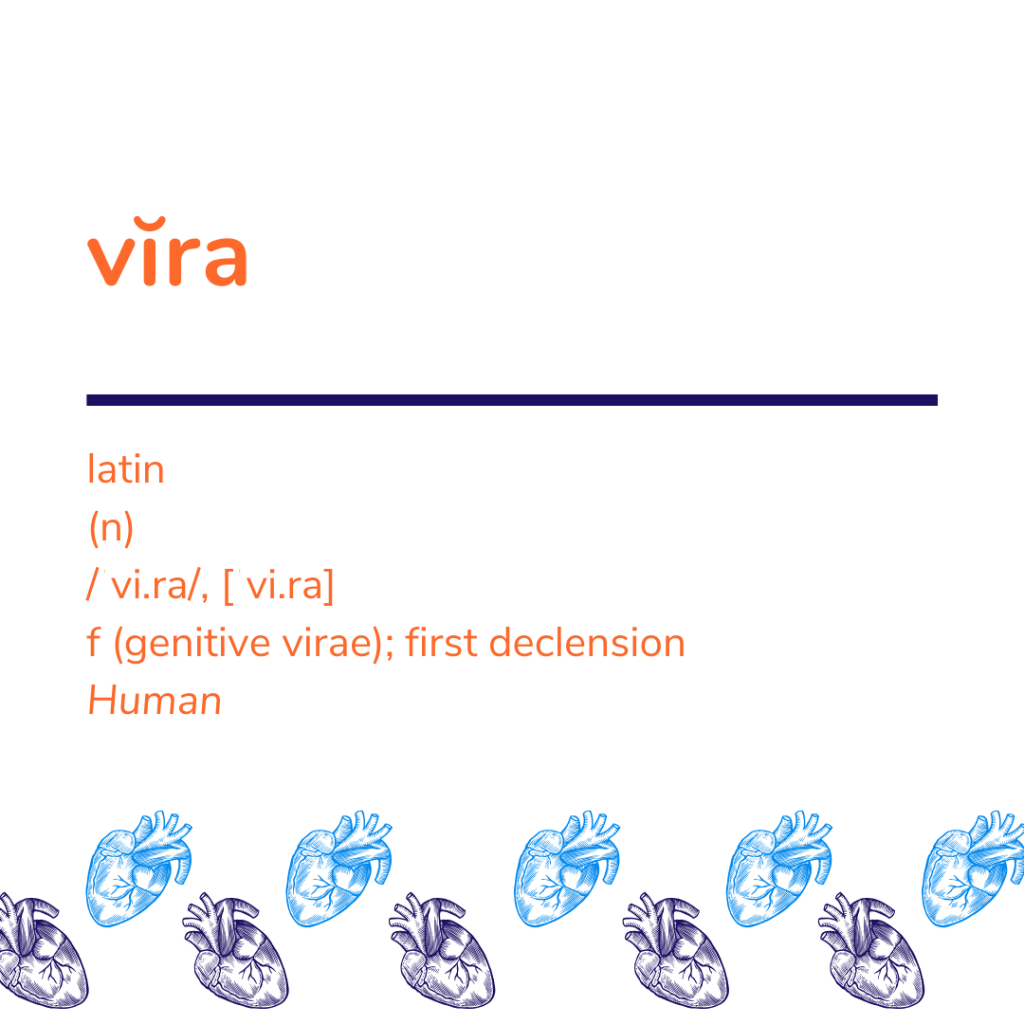“Virasoap… what does that mean?” We get this question a lot. There’s a lot of meaning packed into our eight letters, and we’d love to share it with you. To help understand our name better, start by breaking our name into two parts: Vira + soap.

The first half of our name finds origin in Latin. Originally in Latin, “vir” meant man or human being. It could specifically mean “man” as in male, or it could mean someone of the human race. We still see and use words with both meanings today, such as how we refer to all of us when we say “mankind”. This noun had a range of meanings such as adult, brave, courageous, hero, and warrior. But there is evidence in humanities that poetic texts have used the more broad definition of the noun. When “vir” was used by Latin poets, they used it to mean “human beings”.
Etymology
From vir (“male human, man”)
Pronunciation
- (Classical) IPA: /ˈwi.ra/, [ˈwɪ.ra]
- (Ecclesiastical) IPA: /ˈvi.ra/, [ˈviː.ra]
Noun: vira f (genitive virae); first declension
| Case | Singular | Plural |
| Nominative | vira | virae |
| Genitive | virae | virārum |
| Dative | virae | virīs |
| Accusative | viram | virās |
| Ablative | virā | virīs |
| Vocative | vira | virae |
Human beings are first and foremost what we stand for. Our mission is treating and supporting humans from the inside, out, using individualized medical interventions. But something wasn’t perfect about just “vir” to represent this. The first declension of the “vir” noun, is “vira” and meant “woman”. We asked ourselves, why can’t we use women to refer to all of us as humans just like history has used ‘men’? After all, the “world of women” has a ring to it, don’t you think?
soap noun \ ˈsōp \
Definition 1a: a cleansing and emulsifying agent made usually by action of alkali on fat or fatty acids and consisting essentially of sodium or potassium salts of such acids
This brings us to the second part of our name: soap. We identify with the general meaning of soap in relation to health and hygiene, but use it in our name for another reason. Did you know SOAP is one of the most common acronyms used by medical providers? It stands for subjective, objective, assessment, and plan. It’s a way for physicians to organize their thought process when approaching a medical problem.
Subjective means the medical history and experience from the point of view of the patient and is often divided up into further categories. This is where providers get to absorb how the problem has been directly impacting the patient, from the best source. Objective means data collected from examination and testing. It can include vital signs and imaging. Assessment means naming the problem or diagnosis by using informed, medical decision making. Plan is how to address and treat the defined problem or diagnosis. In other words, the plan is the treatment and future follow up.
As a practice of physicians, we value and utilize the SOAP mentality with each of our patients, making sure that we are approaching each problem with full attention to detail. We want to be sure we address the whole person to get to the root of the problem and treat the cause. If we just treat symptoms, people wouldn’t get better and heal. Symptomatic management is what modern medicine has been too focused on for too long. We know there’s a better way.
We treat conditions by using modalities of IV therapy, supplementation, diet therapy, and lifestyle intervention. This gives the patient education and power to nourish and energize themselves on a cellular level. It is our mission statement, and it is built into the DNA of our name: treat humans in their entirety — considering their whole wellness picture and not just their symptoms.


